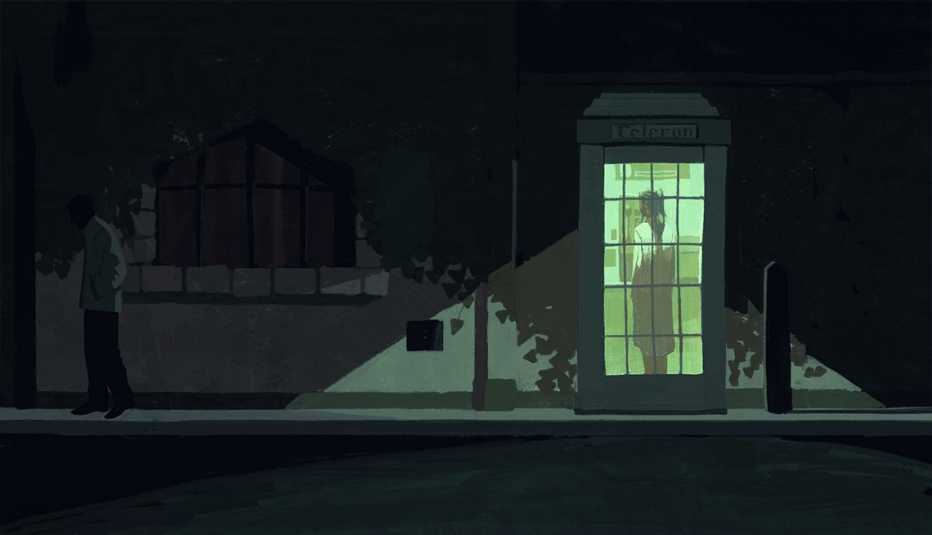Staying Fit


Chapter 23
1993
THE AMERICANS ERIN HAD BEEN talking to at the Raven were William and Gerald Murphy from Boston and they had charged their stay to a credit card belonging to a company called Murphy Brothers Cement. The Irish guy was named Niall Deasey and he owned a garage in Arklow.
Roly Byrne and Bernie McNeely told me all this in a conference room at the garda station. I sat across the table from them and an older guy with gray hair and a fancy moustache who had been introduced to me as Sergeant Ruarí Wilcox. They seemed to be afraid of Wilcox, and I could understand why when he fixed me with an intense stare and asked me if I had ever known Erin to be interested in nationalist politics or political causes. I said no and they asked me if any of the names were at all familiar to me. Again, I said no, and they said that they wanted to search Erin’s belongings again to make sure there wasn’t anything there indicating a relationship with these guys.
“Have you ever heard of the IAFNI?”


AARP Membership— $12 for your first year when you sign up for Automatic Renewal
Get instant access to members-only products and hundreds of discounts, a free second membership, and a subscription to AARP the Magazine.
“The what?”
“Your cousin never mentioned an organization called the IAFNI?”
I shook my head. There was something they weren’t telling me; I was smart enough to know that, and whatever it was had gotten Wilcox into that room. I had the sense that this thing had been moved up some invisible ladder because of what the bartender at the Raven had told me.
“So, none of the names are ones you’ve heard before?” Wilcox asked again.
“No. Why? Have these guys done something? Do you think they know where Erin is?”
No one said anything.
Finally Wilcox said, “The men, the Americans, well, they are known to the RUC Special Branch. We’re looking into this. That’s all I can say.”
I stared at him.
All my associations with the RUC, the Royal Ulster Constabulary, were from history, grainy black-and-white documentary footage of riots. The RUC was the police force of Northern Ireland, but I remembered reading that it had colluded with Unionist paramilitary groups — the ones that wanted Northern Ireland to remain part of the United Kingdom. I assumed Special Branch was responsible for investigating paramilitary organizations during the Troubles. I was thinking about what Conor had told me.
“Okay,” I said.
Wilcox leveled a serious look at me, as though I wasn’t taking it seriously enough, even though I’d barely breathed since he started speaking. “If your cousin was mixed up with these fellas, she was playing with fire.”
I found a pay phone and used the rest of my phone card to call 617 information and then the main switchboard for Boston College and asked to speak to Ingrid Harbit in the English department. Ingrid had been the graduate teaching assistant for a class I’d taken at Notre Dame, and she’d helped me with my thesis. I knew she’d gotten a job as an assistant professor at Boston College and, most important, I knew she knew her way around a research library.
“Ingrid,” I said once I had her on the phone, “I’m in Ireland and I don’t have time to explain, but I’m looking for my cousin who’s disappeared. It’s kind of an emergency. I need to know if you’ve ever heard of two guys named William and Gerald Murphy in Boston. They have a company called Murphy Brothers Cement, and they may be connected with something called the IAFNI.”
“Irish Americans for Northern Ireland,” Ingrid said. “I can look around a little. I have a colleague who may be able to help. When do you need to know?”
“As soon as possible,” I said. “We’re worried something happened to her. I’ll have to call you back, though. I’m not by a phone.”
I could hear her hesitating. “Okay. Give me two hours and then call back at this number. I’ll see what I can do.”
“Thanks, Ingrid.”
I wasted time looking at shampoo in a drugstore on Grafton Street and then browsing the books at Hodges Figgis on Dawson Street until it was time to call back. Ingrid answered on the second ring and as soon as I heard her voice, I knew she had something for me.
“Okay. Got lucky. My colleague remembered that there’d been something in the papers about them so I checked and, well, in 1989, they held a gala fundraiser for the organization you mentioned, IAFNI, Irish Americans for Northern Ireland. My colleague says it’s a well-known front for the Provisional IRA. They raised fifty thousand dollars. The fundraiser sparked a protest. The microfilm printing thing was broken here, but I wrote it down in my notebook.” She raised her voice an octave, so I’d know she was quoting. “One of the protesters was Kevin Mahoney, from Donegal, Ireland. Mahoney was holding a sign reading, ‘IAFNI equals Terrorists.’ Mahoney said he’s lived in Boston for five years. ‘I’m as patriotic as they come,’ he said, as guests filed into the Boston Central Hotel for the fundraiser. ‘But these fellas have no business meddling in things they don’t understand. American money is as bad as British money. They’re all the same.’ ”
Ingrid told me that according to the article, the IAFNI was founded in 1982, supposedly to raise money for the families of Republican prisoners in Northern Ireland. I thought about Uncle Danny’s bucket and Conor’s explanation.
My card was running out, so I thanked Ingrid and she said she would see what else she could find if I wanted to call back in a few days.
I got a coffee, finished it slowly, then bought another phone card and went back to the pay phone. There was now a guy about my age inside and I could just barely make out his words through the glass: “I’m tellin’ ya. I’m tellin’ ya I didn’t get off with her. I swear I didn’t. I missed the last bus, was all, and I slept in a chair.” He stood there for a minute, holding the receiver in his hand, staring at it, and I guessed he’d been hung up on. I knocked on the glass and, dazed, he came out of the phone booth and sunk down onto the low brick wall, his head in his hands.
I squeezed past him into the phone booth. Roly Byrne answered on the first ring. It might have been my imagination, but I thought he was waiting for something.
“It’s Maggie D’arcy,” I said. “William and Gerald Murphy were definitely supporters of the IAFNI. They definitely fundraised for the Provisional IRA. Why would they be interested in Erin?”
“How did you get all that in the last couple hours?”
“What are you doing about it? What if they tried to recruit her or something and she said no and they were worried she’d tell someone so they” — I couldn’t say it — “did something to her?”
“Jaysus. Look, get off the phone. I’ll meet you in St. Stephen’s Green in an hour. By the famine statues. Okay?”
“Okay. Did you get some of this, too?”
“Not on the phone.” He slammed it down. I stood there for a minute, my heart pounding, listening to the beeping dial tone. The handset was cold on my face. It smelled metallic, faintly like blood.
He was already there when I reached the statues, thin gray figures, their suffering evident even from far away. As I got closer, I could see that one figure was feeding another from a round spoon, filled with rainwater.
Roly Byrne didn’t see me coming along the path but he was alert, checking in all directions, looking suspiciously over his shoulder. I found myself following his lead, pausing and checking to make sure no one was tailing me before I came up behind him and tapped him on the shoulder.
“Christ!” His hand came up.
“What’s going on?”
“Let’s walk.” He set off at a fast pace, but I matched him step for step, even though his legs were longer than mine. He was breathing hard before I was.
“Right. You can’t be going around asking questions about this.” His eyes were hard, ice blue. I suddenly had a sense of what it would have been like to be on the other side of an interview table from him.
“But what if they know where Erin is? What if they kidnapped her or something? Doesn’t everyone understand that we might not have a lot of time if — ”
“Look, I don’t want to sound harsh here, but this is something bigger than your cousin. This is ...” He trailed off as a man in a black leather jacket came along the path in front of us.
“What?” I whispered, once the man had passed.
“Politics. You have to let this go for a while.”


































































More From AARP
Free Books Online for Your Reading Pleasure
Gripping mysteries and other novels by popular authors available in their entirety for AARP members